The Disability Rights Legal Center maintains three programs:
Civil Rights
Litigation Program
The Civil Rights Litigation Program provides holistic legal assistance to people with disabilities and invests in otherwise neglected communities by advocating for equality, inclusion, and access. These cases aim to create systemic changes that benefit the entire disability community by reshaping attitudes, challenging perceptions, and influencing future policies, procedures, and structures to effect positive change for people with disabilities nationwide.
DRLC’s cases and work within the Civil Rights Litigation Program address the following issues: Education access; pedestrian rights of way; health and safety for incarcerated people; reasonable modifications to state and government policies and practices; translation services in hospital settings; effective communication in public services; housing access; criminalization of the unhoused; service animals; children in foster care; voting rights; access to benefits; and juvenile justice.
Cancer Legal
Resource Center
DRLC’s Cancer Legal Resource Center (CLRC) addresses legal issues faced by people with cancer, whose needs are unique in the disability community. Since its creation in 1997, CLRC has reached more than half a million cancer-affected individuals, including those with limited access to legal resources, through its national telephone assistance line, outreach programs, and community activities.
CLRC educates and supports those affected by cancer. Individuals with cancer must manage and navigate many unique legal issues in addition to managing their healthcare. CLRC helps by providing resources and information to address workplace rights and accommodations, estate planning after a cancer diagnosis, managing medical debt, housing rights, and navigating health insurance. CLRC maintains a panel of pro bono attorneys for callers needing legal counsel. CLRC also provides key and supportive information through its Patient Legal Handbook to individuals, community-based organizations, nonprofit organizations, community partners, hospitals, and clinics. In 2023, CLRC enhanced its service model and launched the Legal Self-Help Clinic, a mobile resource that travels to medical facilities in Southern California to provide legal resources directly to those in need.
For more information on the Cancer Legal Resource Center, please click here.
Community Outreach,
Resources & Education
(CORE) Program
The Community Outreach, Resources, & Education (CORE) Program serves as DRLC’s front line, ensuring two-way communication between our teams and community. CORE seeks to map existing resources and to connect community-based organizations to work synergistically alongside established and emerging leaders, avoid silos, and remain responsive and attuned to the community. CORE staff works closely with the litigation team to investigate impact cases that may be filed in federal and state courts and administrative forums. CORE also educates the community, conducting community training on issues that affect individuals with disabilities, and advocates for those with disabilities.
